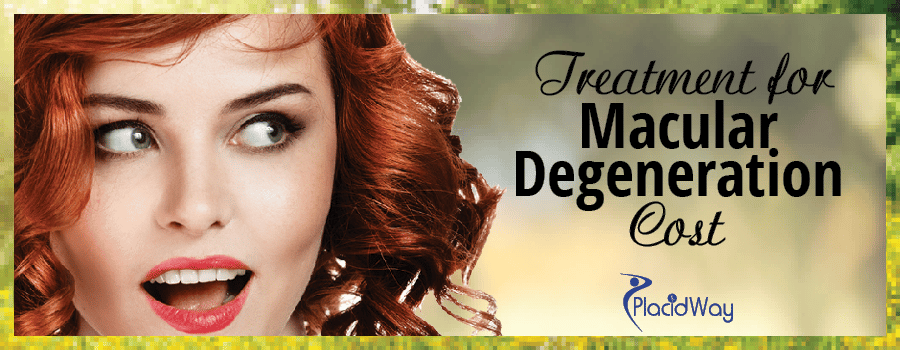
Macular Degeneration Treatment Abroad
Overview

ost cases of macular degeneration are caused by age. Also known as age related maculopathy, the condition causes progressive damage to the macula, or the most vital part of the retina. This damage can result in a gradual loss of vision. In order to understand macular degeneration, classified as a retinal disorder, it's important to understand the function of the retina.
The cornea and lens of the eye focuses light onto the retina. The retina is a light sensitive and transparent membrane found on the inner surface of the back of the eye. The macula is the most important area of the retina and contains a high number or density of color sensitive photoreceptor cells. The cells, called cones, produce sharp visual images, and are most responsible for central vision. A number of rods, another name for the photo- receptor cells, surround the periphery of the retina. These rods are sensitive to lower lighting levels but are not color sensitive. The rods of the eye are responsible for night and peripheral vision.
Types of macular degeneration
Two forms of age-related macular generation are diagnosed today: atrophic, or dry, and neovascular, or exudative, or wet macular degeneration. Atopic macular degeneration causes the macula to thin as the production of cells decreases.
Neovascular macular degeneration is caused by the development of abnormal blood vessels in layers of tissues found under the macula. These tissues leak led or other fluids under the retina and tell scar tissue develops.
The symptoms of macular degeneration may take years to develop to the point where vision is moderately affected. In many cases, central vision slowly decreases and worsens over time, although the condition doesn't cause pain.
In some cases, an eye examination may identify physical changes near or around the macula before a person's vision is decreased. In cases of wet macular degeneration, vision loss tends to happen rather quickly, especially in cases where the abnormal blood vessel leaks or bleeds. Initial symptoms include vision distortion in one eye, or straight lines that appear wavy. Individuals with this kind of macular degeneration may find it difficult to watch television or read.
Diagnosing Macular Degeneration
In most cases, an ophthalmologist may identify and diagnose macular degeneration following an exam of the eye or eyes with an ophthalmoscope, or using a slit lamp. In some cases, your ophthalmologist may request a fluorescein angiography. In this procedure, dye is injected into a vein and photographs are taken of the retina, which usually suffices to determine a diagnosis.
Treatment Options for Macular Degeneration
Currently, there is no treatment for dry or atrophic macular degeneration. Transplantation of retinal tissues is currently being explored and, eventually, may be available.
In the case of wet or neovascular macular degeneration, thermal laser therapy can be utilized to destroy the new, abnormal blood vessels that grow in or around the macula.
Photodynamic therapy is also an option. Photodynamic therapy utilizes a substance that makes the blood vessels in the eye sensitive to a laser light. It's given intravenously, followed by the application of a laser light beam to destroy abnormal blood vessels.
Another popular treatment for wet macular degeneration is transpupillary thermal therapy, in which infrared lasers are used. Transpupillary Thurmont therapy and photodynamic therapy don't damage the retina.
For those who cannot be treated, the use of magnifying devices, reading glasses, and magnifiers is recommended.
How much does Treatment for Macular Degeneration Cost?
Treatments for retinal detachment depend on the method utilized. In the U.S., costs for treatments or surgery can average $5,000 to $25,000 per eye after anesthesia, surgeon and hospital care costs. Costs are based on method of treatment. Some patients are prescribed Avastin, a cancer drug, for treatment of macular degeneration, with average cost of $50 per dose. In foreign destinations, treatment options in other countries such as India or Singapore may enjoy savings of between 35% and 50% on costs incurred in the U.S.
Who Performs Treatments?
Examination, diagnosis, and counseling regarding macular degeneration and options available are typically performed by an ophthalmologist or optometrist who specializes in the treatment of those with poor vision. An ophthalmologist should be licensed and trained and certified to perform eye surgical procedures. He or she should also be trained to use of laser and ultrasound equipment. Medical licensing in the United States is by local, state, and national medical boards. A good choice would be a doctor who is a Fellow of the American College of Surgeons, or one who is associated with an academic medical center as they are more apt to be trained in new or advanced procedures.
If you want to know more, you can always contact us and ask for more info.

 ost cases of macular degeneration are caused by age. Also known as age related maculopathy, the condition causes progressive damage to the macula, or the most vital part of the retina. This damage can result in a gradual loss of vision. In order to understand macular degeneration, classified as a retinal disorder, it's important to understand the function of the retina.
ost cases of macular degeneration are caused by age. Also known as age related maculopathy, the condition causes progressive damage to the macula, or the most vital part of the retina. This damage can result in a gradual loss of vision. In order to understand macular degeneration, classified as a retinal disorder, it's important to understand the function of the retina.